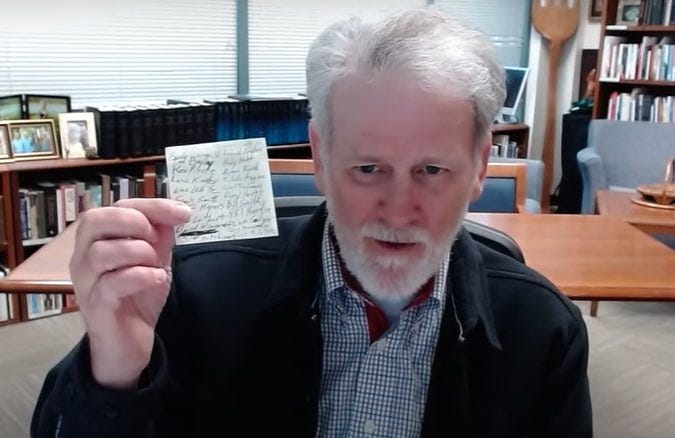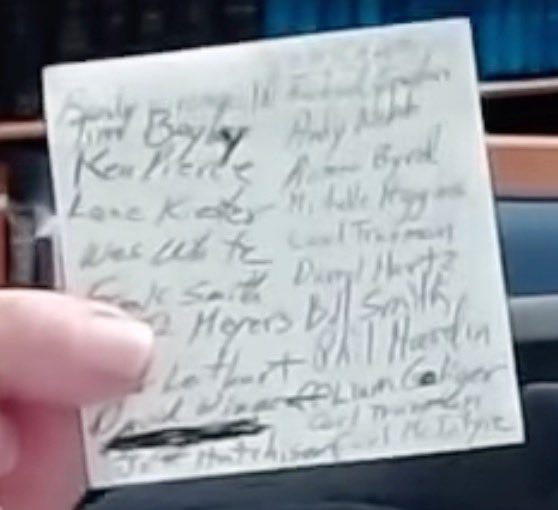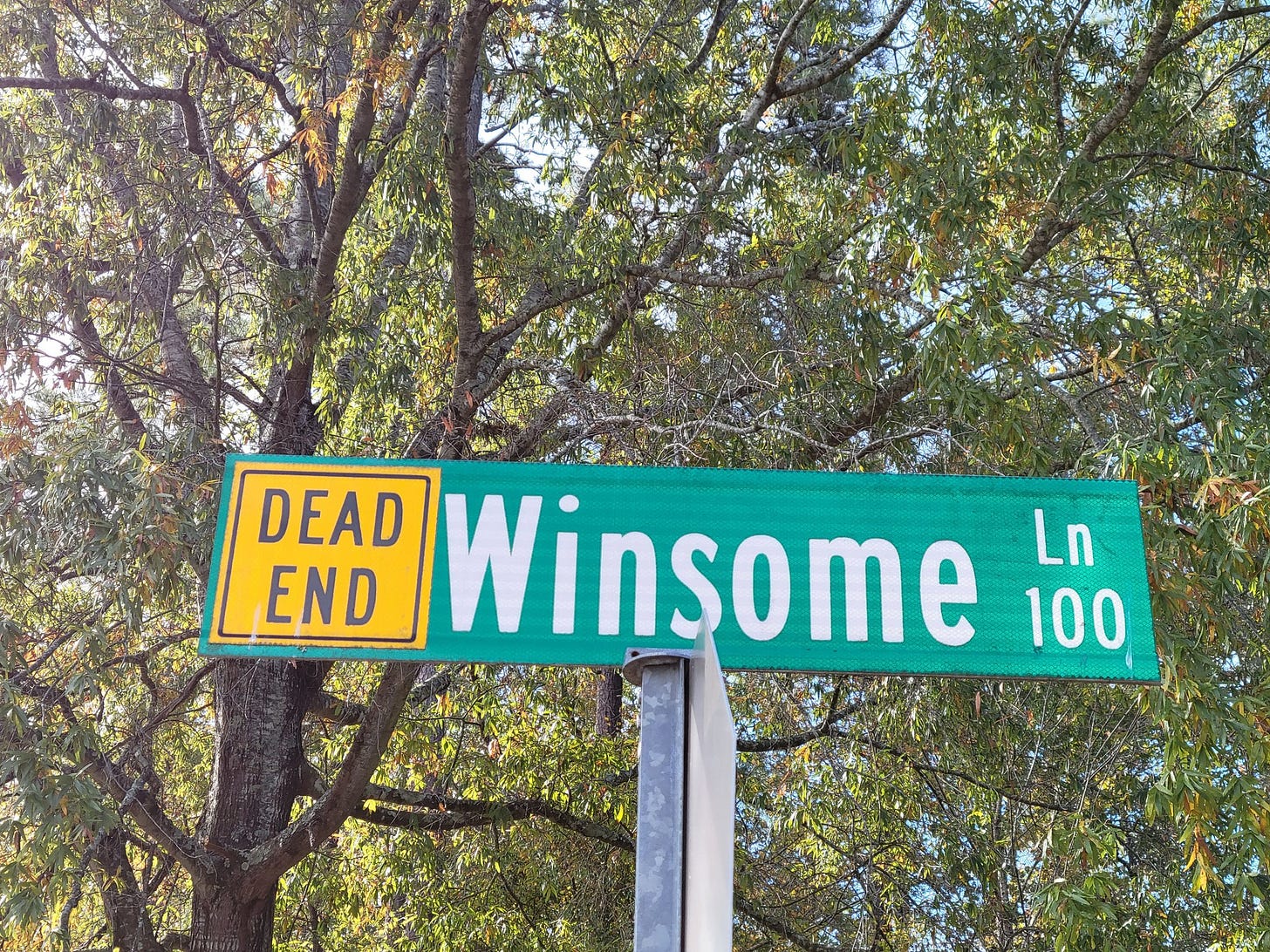Fourteen Hours that Changed My Ministry
Lesson learned: nice guys may not be as nice as you think
I once learned a valuable ministry lesson the hard way.
Some quick context on the story I’m about to share. Bryan Chapell is a pastor, theologian, author and speaker. He’s been the Clerk of the PCA (Presbyterian Church in America) since 2014. He’s also President Emeritus of Covenant Theological Seminary in St. Louis, MO, where’s he’s served for nearly 20 years. On a recent podcast episode with Colin Hansen, Chapell talked about carrying around a list of names of men he calls “scandalizers,” who spend time destroying others and the church. He said everyone on his list has left their family, their faith, or taken their life.
Chapell didn’t think flashing the list very briefly in front the camera would be enough for someone to screenshot the image and decipher many surprising names on the list. If you look closely enough, you can see for yourself.


I don't know Chapell, but I've listened to his lectures, sermons, and read his book on preaching. I've benefitted from them. He always seemed like a nice guy to me. He embodies a "winsome" ministry style. So I find it strange that such a nice pastor carries around a hit list. That's not very nice.
Early in my ministry, I was warned about "prophetic" kinds of pastors, bold and direct, who were presumed to be arrogant and mean. Mark and avoid them.
During a crisis in my own ministry, I needed counsel from an older, seasoned pastor. A man from a different tradition than my own came to mind. He was much older. He'd been around the block a time or two.
Online, he was very bold and direct, which made me nervous about him. But it also made me trust him. I thought, "this guy won't flatter me. This guy will tell me the truth. He will say what needs to be said."
He agreed to meet and I went to visit him. I arrived at his office one mid-afternoon. We spoke for a few hours in his office. Then he took me to his home and we talked a few more hours, late into the evening. I took copious notes. I still review them from time to time.
He said things about ministry I'd never heard before. He corrected me and pushed me like no one else ever did. He didn't hold anything back. He helped me see many areas where I was failing to shepherd my church properly.
At the time, I thought being likable was a great ministry asset. I thought people would respect me for being learned and articulate. I thought being nice would make me an effective pastor.
My pastor friend helped me see the truth: niceness was my way of being a coward.
You can't be a faithful shepherd if you're a coward. Perhaps you can have a successful "ministry," but not a faithful one. You have to choose.
What he said hurt me, but I wasn't offended. In a way, I'd always known, but at the time, it was all I knew. I'd gotten pretty far in life being smart, impressive, and talented. I've heard that stuff all my life.
But this guy wasn't impressed with me, which was oddly refreshing. This was a man who feared God and loved me enough to say things no one else would say. That's why I trusted him.
If you were a fly on the wall listening to that conversation, you would have thought, "wow, this old guy is being so mean to this nice, young pastor." But you would be wrong. He wasn't being mean to me, he was shepherding me. He was loving me the way a good father loves a son.
I received a rigorous seminary education (for which I'm grateful). I've been to more conferences and trainings than I can count. But I received more valuable instruction in that conversation than any other in my life. It quite literally changed my ministry.
As I went to bed that night, I sensed the weight of my calling like never before. The fear of God came over me. God had entrusted souls to my care, and I had a duty to shepherd them, not make them like me.
The next morning, we spent a few more hours together. All told, I was there about 24 hours, 14 of which he'd spent with me. I'll never forget it.
Why do I tell this story? Because I learned two lessons on that trip.
First, faithful shepherds will be called mean and arrogant. Honestly, that's what I expected from this man. But the opposite was true. Men who speak inconvenient truths will be hated for it. They will have enemies. They should not be surprised by this; it's what they sign up for.
Second, nice guys can be just as mean as the "mean" guys they criticize, they just mask it better. That's what was so unsettling about Bryan Chapell's list. His nice guy mask slipped, revealing something ugly and vindictive.
The bottom line is this. "Mean" guys may not be as mean as people say. Perhaps they're just more honest and willing to be hated for speaking truth. And "nice" guys may not be as nice as you think. Perhaps they've learned to camouflage hatred beneath a mild-mannered demeanor.
Oh, and one more thing. That pastor who cared enough to spend 14 hours with me, even though he didn't know me and I'm not even in his denomination?
His name is on Chapell's list.
Update
Collin Hansen has since removed the podcast. He and Bryan Chapell have issued the following statements:




I wholeheartedly agree with you. I've always heard it said that if you truly love someone, you will always have the courage to tell them the truth, regardless of whether they want it at that moment or not. It speaks to a deeper level of care and commitment. It also shows that true care isn't always expressed in the gentlest way on the surface.
On a completely different note, it does seem rather telling that Chapell and Hansen apparently wouldn't have issued a public apology if someone hadn't taken a screenshot and publicized their actions. It suggests their apology is more of a reaction to being caught rather than a genuine expression of remorse.
As someone who spent many years in the PCA this is not surprising. Sad, but not surprising